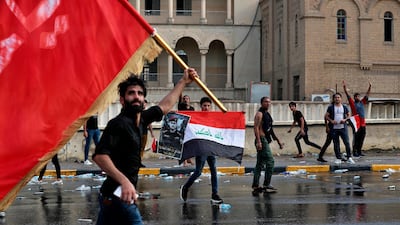Iraq’s political system is broken. The government in Baghdad has not delivered on key governance needs, provided basic services or ensured the safety of its citizens. This is the principal reason that has pushed thousands of protesters on to the streets of several Iraqi cities and garnered the support of millions. In addition to these grievances, there is a sense that Iraq’s national identity and the ties that bind Iraqis together are more important than the divisive politics of sectarianism and ethnic divides that politicians have used to rule the country over the past 16 years. The demonstrators are largely Iraqis coming of age and the current political system is all that they have known. Most of them cannot remember the days of Saddam Hussein, and many were not even born under his rule.
Protesters have been chanting for days for a dignified life, a rejection of sectarianism and calling to end Iranian interference in the country. “I will die a martyr rather than live undignified”, “my salary is $8 dollars a month”, “not Sunni, not Shia, we reject your sectarianism’ are among the chants of young Iraqis.
Their anger is not directly solely at the current administration or its Prime Minister Adel Abdel Mahdi. It is more generally aimed at a system that continues to produce weak governments election after election, as leaders are beholden to political deals ensuring various political parties have a piece of the pie, with none going to its citizens.
Any observer of Iraqi politics could tell it was only a matter of time until resentment and frustration flared up. In the recent crackdown on protesters, 93 people have been killed by security forces and that number is expected to rise. But even if this violent government reaction succeeds in breaking the protest movement, it will inevitably reoccur at a later time. And another election, another government born out of horse-trading won’t solve the deep-rooted troubles of the country.
Iraq faces four possible outcomes after this tumultuous week. One scenario is to postpone dealing with the root causes of the crisis in the country – including a failed constitution, patronage systems based on money and arms – and to repeat the mistakes of having a new election cycle. This will only result in politicians jockeying over posts in a new government and delivering the same failed outcomes as they have in the past decade. This option is doomed to fail. Empty promises of ‘anti-corruption crackdown’ and ‘reform’ are no longer acceptable to most young Iraqis. The anger towards all the unfulfilled pledges of previous elections will not subside with more of the same.
The second scenario is of a rapid outbreak of violence, with greater involvement of militias and irregular forces confronting civilians. The Iraqi security apparatus is not one of police and army alone. The number of security groupings, with different affiliations, means the attacks on demonstrators are often not being carried out by regular security forces. With nearly 100 protesters killed, and 4,000 injured, the governing class could be veering towards this option. Such a path could easily lead to the protest movement going underground and forcing young, unemployed and frustrated young men to have no option but to pick up arms against the state. This type of scenario played out in other Iraqi provinces, especially Al Anbar and Nineveh. Popular discontent was manipulated by armed groups who played on a resentment towards the government and this could happen again. Such a course could lead to major civil unrest and serves no one except armed groups and their supporters.
A third scenario that many of the older generation and some younger Iraqis find appealing is that of a military coup d’etat. Harking back to the old days of military strongmen imposing ‘order’, some have called for the Iraqi army to step in, regain monopoly over the use of arms and reinstate the Iraqi state. Established in 1921, the Iraqi army is the only remaining state institution that is as old as modern-day Iraq and embodies the national sentiment that many young protesters are calling for. The respected head of the counter-terrorism unit that was removed by Prime Minister Abdel Mahdi and became a catalyst for the protests, Abdulwahab Al Saadi, has been named as a possible nationalist leader who has proven his credentials in the fights against ISIS and corruption. But military coups rarely go as planned and protecting a civilian order with the peaceful transfer of power is not to be undermined.
Or there is a fourth option, which calls for a long, tedious yet vital overhaul of the political system. An interim government that would oversee a national dialogue, with a clear mandate to weed out corruption and disarm militant groups, could be a government of national salvation. Respected military figures and civil society activists would have to be included in such an interim government. In the end a presidential system, secured by checks and balances, should emerge to bring the nation together.
People are tired of the status quo based on sects and religious affiliation. The leadership of Iran-backed Shia Islamist political parties is under intense scrutiny. Meanwhile, the rule of other political parties that claim to speak for specific sectarian or ethnic groupings, rather than the country as a whole, has been rejected. People will not accept another "musical chairs" exercise of shuffling the representatives of the same political cliques. Whether those in power have the foresight and political courage to overhaul the system they have personally benefited from is a long shot – but it is necessary.


